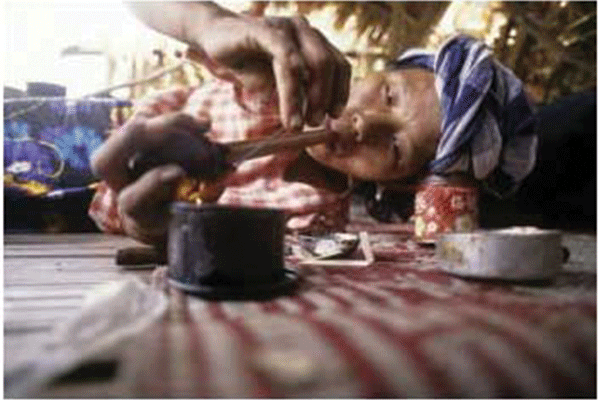
George Machanja THE proliferation of illicit drug peddling in Zimbabwe calls for authorities to act swiftly by imposing stiff penalties for those caught engaging in this nefarious business.
As is the case in China, dealing in dangerous drugs is punishable by death and this has effectively reduced the number of those who dare try a hand at this unlawful business.
Sadly for Zimbabwe, the spike in dangerous drug trade and use is roping in youths, most of whom are without jobs or any other business to do.
Surprisingly though, recent reports in the mainstream media have pointed to drug and substance abuse also being committed by some working-class citizens.
Whether the main cause for this new trend is related to stressful experiences or just adopted habits by individuals, is yet to be discovered, but slowly our country is becoming a mimicry of Colombia.
While it is critical that our youths must not be left in the wilderness and dilemma of thriving unemployment, there is need to divert them from not only consuming dangerous drugs, but also tasting the profits of peddling them, which often come with high margins.
It is, therefore, incumbent upon government to invest in opportunities to be take up by the youths, before crafting punitive measures against trading in illicit drugs.
In simple terms, our young people need firm guidance and education, coupled with opportunities for then to improve their social standing in places and environments where they live.
- Chamisa under fire over US$120K donation
- Mavhunga puts DeMbare into Chibuku quarterfinals
- Pension funds bet on Cabora Bassa oilfields
- Councils defy govt fire tender directive
Keep Reading
In the case of China, where the offences of dealing in illicit drugs will set one for a date with the hangman, the opportunities of employment are vast, even though in some cases, if not most, the remuneration and working conditions may not be so favourable.
The Chinese authorities have made sure that drug trafficking in the vast nation should never be tolerated, and obviously the consumption of such has been kept at bay.
Although commendable, the efforts by Zimbabwean authorities to curtail drug trafficking and peddling are still at infancy stage, and there is need to quickly catch up with increasingly sophisticated cartels emerging now with relentless appetite for making quick money.
It is important to first identify the main driver for what is threatening to destroy our societal fabric.
There must be total annihilation of whatever gave rise to the production of illicit drugs and substances.
Poverty and lack of equal opportunities are usually the main driving forces as made evident in countries like Colombia where the business of manufacturing and trafficking dangerous drugs thrives the most.
Colombia has churned out billionaires in the form of drug lords, and the quickest to come to mind is the infamous Pablo Escobar.
Pablo made an estimated fortune of US$25 billion, making him one of the wealthiest citizens of Colombia.
What made him thrive even more were the rewards that he realised from his unlawful business.
The profits were super high, and he had ample money to splurge on luxuries.
In Zimbabwe, the prolonged economic decline has left most citizens in desperate situations that call for desperate solutions.
The Second Republic of President Emmerson Mnangagwa seems to have picked a line towards sustainable development of the economy and this should provide a good starting point.
The current road and infrastructural developments around the country point to positive economic growth.
Now following up on these positives, government must take advantage of them by promulgating laws that guide people, mostly our youths, to take up new opportunities and depart from unlawful activities such as dealing in dangerous drugs.
With efforts being initiated to deal with drug and substance abuse, the Zimbabwean police has reportedly embarked on an operation to sanitise areas that are highly involved in this menace.
The already drafted Zimbabwe National Drug Master Plan needs to be promptly operationalised before we fail to control the peddling and abuse of drugs and substances.
Perhaps it is high time the authorities started to implement tougher punishments, almost akin to those of China, to eliminate the scourge completely.
While it has become common knowledge that the current administration is keen on moving away from the death penalty, other tough punitive measures have to be implemented to counter unlawful dealing in hard drugs and substances.
There is absolute need for intolerance to the peddling and use of drugs which invariably is picking up steam.
As we all know big things always start small, failure by government to nip the drug trade in the bud may lead to astronomical challenges in the future.
Our authorities must intensify efforts to foil the growth of drug and substance abuse, by apprehending leading members and punishing them severely.
Since government claims to have initiated a multi-pronged approach in curbing this practice, more effort should be put on eliminating the sources and clamping down on the kingpins.
Our cultural values are sagging because of drug abuse, and health facilities are getting overwhelmed by mental health cases linked to the practice.
Mnangagwa once said: “Law enforcement agencies and the courts must work in concert to ensure that perpetrators of gun- related crimes, violent drug kingpins, the supply chains, and drug vendors are definitely smoked out and brought to book”.
In view of this, our government has got its work clearly cut out in terms of dealing with narcotics traffickers, and the sooner deterrent punishments are meted out the better.
George Machanja is a social commentator and he writes here in his personal capacity.











